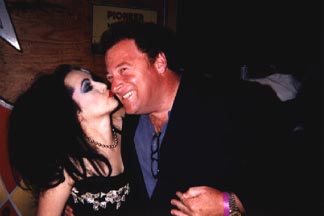
A sudden blow: the great wings beating still
Above the staggering girl, her thighs caressed
By his dark webs, her nape caught in his bill,
He holds her helpless breast upon his breast.
How can those terrified vague fingers push
The feathered glory from her loosening thighs?
How can anybody, laid in that white rush,
But feel the strange heart beating where it lies?
A shudder in the loins, engenders there
The broken wall, the burning roof and tower
And Agamemnon dead.
Being so caught up,
So mastered by the brute blood of the air,
Did she put on his knowledge with his power
Before the indifferent beak could let her drop?
The above poem is Leda And The Swan by William Butler Yeats who may have been inspired by the Peter Paul Rubens painting Leda mit Schwan that hangs in the Zwinger gallery in Dresden and in turn both may have inspired David Herbert Lawrence to paint his own interpretation of Zeus at his playful best. It was in the woods outside Dresden that Lawrence had his creation Constance Chatterley give up her virginity.
In late 1974, I went on pilgrimage to Dresden just to see the Rubens. It was during the old days of the DDR and Dresden just was not on the usual tourist map, apart from coachloads from the eastern bloc. It was a winter's day and even those coachloads were missing and I seemed to have the re-built former palace to myself.
I must have stood before the Rubens for an hour, unimpeded by another soul.
That same trip, I managed to get a very attractive east German girl in heaps of trouble by visiting her at her college dorm, as a prelude to the proverbial walk in the Saxon woods. As I didn't speak German at the time and her English would have been, at best, halting I don't think I would have performed my usual act of seduction by reciting in a stentorian voice the Yeats poem. It would be nice if just one of the young ladies I met at parties in the early 1970's might now register in the comments section their bafflement, bemusement, utter horror at my having launched unprovoked into that recitation at what may have been otherwise a pleasant party for teenagers.
I would also recite a poem or two of my own. I had started writing as an anguished 15 year old and periodically would write for the next dozen years. For many of those years I received enormous, quite undeserved support from Stuart Hood. An interesting factoid is that Stuart was Wolf Biermann's translator and champion in Britain and 10 years later in California my company released a recording from Nina Hagen, Wolf's step daughter.
A crushing blow was having an elegiac poem I wrote in October 1974 upon John Carleton's death ignored by the editors of The Elizabethan, the Westminster School magazine; Carleton had spent virtually his entire life at Westminster as pupil, teacher and finally Headmaster. I have lost the beginning but I believe the final 2 stanzas are a good representation of the whole :
They say he was "great"
He opened his heart
I saw
And felt his hand
Stretched away
He had this special loyalty
To his suit
He let people cheat
He was with the rest
Only last year he asked me to tea
Sir, if only you could say
Today
Do Come
I would more than accept
My love goes on
John Carleton is dead
If anyone has the beginning to this poem, kindly post same in the comments.
Earlier that year I was profoundly affected by the crash of Turkish Airlines flight 981, outside Paris en route to Heathrow. Among the horrific number of 346 killed was Geoffrey Brigstocke whose son David had been a classmate of mine at Westminster and whose daughter Persephone was a friend. I was moved to write the following entitled Paris Aircrash And After for Persephone :
Faint feelings of concern
The hiss and roar of vast engines far above
In another world in the sky
His mind loosens the body resting in deepset chair
The few last seconds
Are gone
His senses die with the blast
We find his daughter hearing the quiet news
Of delayed despair regret
Inevitable that the picture she sees
Is of a younger man
Of twenty years ago
And she is just sixteen
The wait for emotion
Rushing to flood her presence
Under the coverlet
She sees his empty future
And fills it with future thanks
And dedications
Cries
Where is he? Daddy, please take care
It's her way of asking forgiveness
She knows she'll marry, produce
Say to all of them
He's quite dead and far gone
Like future boyfriends

